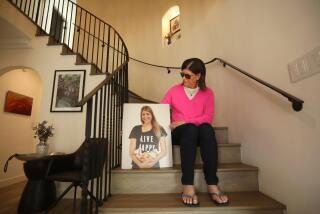Moments of poetry witness the end of a life
- Share via
EARLY in “Excerpts From a Family Medical Dictionary,” Rebecca Brown describes what it’s like to help someone who can’t swallow. She is holding moist little sponge on a stick, like a lollipop, to the dry lips of her mother, Barbara, who is dying of cancer: “You were supposed to hold it so they couldn’t try to swallow it. I remember holding it, the pull of it, the want.”
Broken into stanzas, it might be poetry, this little description of the act of sucking, of someone’s will to survive. In all such vivid details, Brown’s memoir raises an important question: How does one make the death of a beloved parent meaningful to strangers?
Let’s be honest: So many memoirs of terminal illness have been published that the death scene and all its metaphors have hardened into cliches. Words like “struggle,” “battle,” “agony” and “horror” evoke little because they are used so often.
But Brown, author of the acclaimed 1994 novel “The Gifts of the Body,” adheres to a clear, effective rule: Avoid easy emotional appeals to the reader. The result is a slim memoir whose size doesn’t suggest her mother didn’t deserve more; in fact, this incisive story of Barbara’s diagnosis of stomach cancer while in her late 60s is honed down to the most essential details of what happens when families face a terminal illness.
“When her doctor came up to me, he was still in his whites.... He said he couldn’t be certain until they got the biopsy back, but ‘the tumor was probably cancerous.’
“Then I was doing this thing with the words in my head. I said to myself, He didn’t say she had cancer, he only said the tumor was probably cancerous and tumors can be taken out.”
Some readers will be surprised by this desperate parsing of language, thinking maybe that such hunts for meaning only happen to students in an English class -- others, however, will think, “Yes, we’ve been there.”
Each chapter opens with a definition -- of anemia, for example, or metastasis -- and then describes what this meant in Barbara’s life. We see how children and parents reverse roles when illness intrudes. Chemotherapy fails; Barbara weakens, loses her appetite, has trouble breathing. In the chapter “hallucination,” she searches for children playing hide-and-seek in her bedroom. Then she sees her father coming down the hall. Are these just products of a febrile mind? asks Brown. Or, she wonders, are they a sign of something else?
Mothers, this book reminds us, are anchors -- Barbara has certainly been Brown’s. She forms a part of all Brown’s childhood memories, while her father, a military man, never enters the story. (His absence is never explained.) When Brown massages her mother’s achy body with aromatic oils and, later, when the body is washed before it’s taken for cremation, she expresses wonder at what a mother is:
“We covered her with flower petals and herbs we got from her garden.... We covered the flesh that had carried her, the body she had borne, that she had birthed us from, the body from which we had washed the final sweat. When this was done we lay her down in her bed alone as if she could rest until morning.”
Her lyricism is quiet, not raging -- critics have likened its simplicity to that of Shaker furniture. What comes through her chiseled lines is how, with a mother’s death, our earliest connection to the world is cut. At the end, when the family takes a ceramic pot of her ashes to a favorite canyon, Brown leaves us with a final haunting image:
“[A]fter a while my brother ... picked up the pot, as all of us had asked him to do, and threw it far across to the other side of the canyon. We heard it crack, then saw the puff of the last of the ashes released. They floated, suspended, until they sank. We watched the air in front of us go smoky and gray to clear.... “
What remains when the air clears? Essential things, Brown’s limpid memoir suggests: our memories, love, a canyon in the sunlight.
More to Read
Sign up for our Book Club newsletter
Get the latest news, events and more from the Los Angeles Times Book Club, and help us get L.A. reading and talking.
You may occasionally receive promotional content from the Los Angeles Times.









